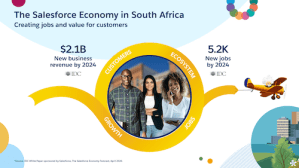At Salesforce, we’re incredibly proud of the results our solutions bring about, and some of those results are highlighted in the recent International Data Corporation (IDC) white paper, The Salesforce Economic Impact: 4.2 Million New Jobs, $1.2 Trillion of New Business Revenues from 2019 to 2024.
It looks at the Salesforce ecosystem, which is not just Salesforce, but our customers and partners that provide products and services on top of our subscriptions – including third-party providers introduced to the customer by partners as well as our official partners.
Here, we’re focussing on an addendum to the white paper, The Salesforce Economy in South Africa, which forecasts the Salesforce ecosystem’s economic contribution to the South African economy. If your business is part of the Salesforce ecosystem and you currently work with South African customers or are considering selling to South Africa, here’s the information you need.
The Salesforce economy in South Africa
- Cloud computing is expected to grow by 29% between 2018 and 2024.
- Non-cloud software spending is expected to decrease by 4% over the same period.
- Salesforce and its ecosystem are expected to enable 5,240 jobs to be created and add $2.1 billion in new business revenue over that period.
- Customers of cloud computing subscriptions also spend on supplementary products and services, so the Salesforce ecosystem in South Africa in 2019 was 4.8x as big as Salesforce, and by 2024 will be more than 7x as big.
Cloud software and innovation
One of the many economic benefits of cloud computing is the way it allows IT resources to focus more on innovation, rather than on routine tasks and processes. It also increases a business’s ability to be agile, meaning they can scale innovation efforts as needed.
Innovation is one of the key concerns among marketers in South Africa, but there’s still plenty of work to be done on it over there. That means for businesses in the cloud computing space, there’s a definite competitive advantage to be achieved over there.
Cloud software accounted for 20% of overall software sales in 2019, and with the Compound Annual Growth Rate (CAGR) set to increase by 29% by 2024, there is great potential for even more growth.
You might be wondering, but how does this benefit me, as a Salesforce customer or partner?
Here are the stats:
- New revenue and jobs generated by innovation brought about by the introduction of Salesforce. (5240 direct jobs)
- Jobs created in supply/distribution serving Salesforce customers. (6900 indirect jobs)
- Third-party products and services are bought alongside each new Salesforce cloud subscription.
IDC estimates that for every dollar Salesforce made in South Africa in 2019, the ecosystem made $4.75. This is expected to increase to $5.26 in 2020 and $7.03 in 2024.
Digital transformation is key
In the current climate, economic uncertainty and consumer concerns mean that digital transformation is key. This means that the demand for cloud computing can only increase, and new customers implementing Salesforce in South Africa will also need ancillary products and services. This is where the ecosystem of Salesforce partners and customers comes in.
























